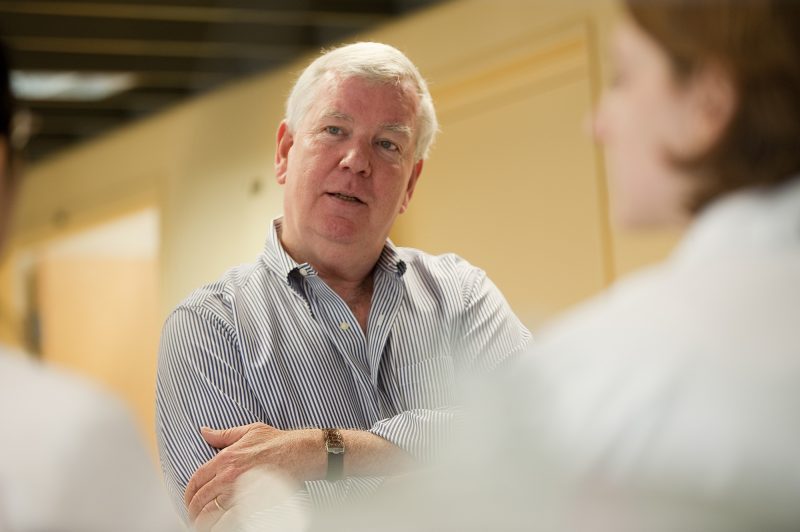A protein that lubricates the joints may soon bring stress relief to dry eyes around the world…
A biopharmaceutical company, Novartis, has recently licensed the use of lubricin – a protein first discovered in the knee as a joint lubricant – for the treatment of dry eye disease. This licensing is due in large part to collaborative work that began 11 years ago by Dr. David Sullivan at Schepens Eye Research Institute of Mass. Eye and Ear, his son, Dr. Benjamin Sullivan, and Benjamin’s roommate at the University of California, San Diego, Dr. Tannin Schmidt (now a scientist at the University of Calgary).
Lubricin has the potential to address a huge unmet need in eye care, with hundreds of million patients around the world impacted by dry eye disease. There is currently no cure for the condition.
From the joints
In the joints, lubricin acts as a boundary lubricant, reducing stress and friction in the knees, shoulders and other areas of the body. When joints become swollen for various reasons (from certain medical conditions to high impact activities), the inflammation can suppress the production of lubricin, causing the cartilage to touch each other and resulting in wear, tear, pain and arthritis.
Interestingly, lubricin also exists on the surface of the eye. In this setting, lubricin plays in important role in maintaining a healthy tear film on the ocular surface and reducing friction between the surface of the eye and the eyelid. Production of lubricin may be reduced when there is inflammation on the ocular surface, as is seen in dry eye disease.
Giving lubricin back to dry eyes
Based upon their findings, the research team founded a small company, Lµbris Biopharma, and set out to develop lubricin as a novel therapy for dry eye disease. They spent more than 6 years generating a recombinant human lubricin, and then tested this protein in a clinical trial.
“The results demonstrated that topical lubricin dramatically reduces the signs and symptoms of dry eye disease in a very short period of time,” Dr. David Sullivan said.
Dr. David Sullivan has spent the vast majority of his career tackling dry eye disease. In addition to his work on lubricin, he discovered the significant impact of androgens, a sex hormone, in promoting lacrimal and meibomian gland function. These studies have led to successful, and currently ongoing, clinical trials of topical androgens for the treatment of meibomian gland dysfunction, the leading cause of dry eye disease. Just this month, he also appeared at a Congressional Briefing on dry eye disease.

More potential applications for lubricin
Alongside investigations for dry eye disease, the researchers are testing other ways to use lubricin. The research team believes that the anti-adhesive properties of the protein may prevent the formation of ocular surface adhesions, such as those developing from burns of the eye and Steven-Johnson’s syndrome. Further, Dr. David Sullivan’s colleagues are examining whether applying lubricin to contact lenses may prevent friction, and the resulting discomfort that leads to the discontinuation of contact lens wear by tens of millions of people every year. Lubricin has many other potential treatment applications, from xerostomia, to arthritis and to many other age- and inflammation-related conditions.
The pathway from the discovery to the commercialization of lubricin represents one of our major goals in medical research – the translation of scientific findings to new, life-changing therapies to treat our patients.




I will like to get information about that sujec as my eyes and join are very dried
Hi Minerva, sorry to hear that your eyes are very dry. We would encourage you to follow up with an ophthalmologist on new therapies for dry eye disease as they become available.
How can I get some Lubricin? The standard eye drops burn terribly so I don’t use them, leaving me with watery eyes. Thank you.
Thanks for reading, Sandra! Unfortunately these drops are not yet in clinical trials in the United States. We expect them to begin in the near future, and would encourage you to ask your ophthalmologist to keep you apprised of new therapies for dry eye disease as they become available.
How does one apply to be treated with Lubricin? I have severe dry eye and i’m afraid of losing my eye-sight
Are clinical trials of lubricin now underway in the United States? Where can I learn more about trials? Thank you.
Hi Ruth, here is a list of all clinical trials happening at Mass Eye and Ear. I do not see one for Lubricin listed here, but encourage you to visit ClinicalTrials.gov for more information in case there is one elsewhere.